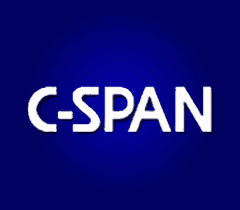Today I am testifying at an FCC hearing on “Serving the Public Interest in the Digital Era.” [Speaker lineup here.] The purpose of the workshop is to explore:
- A brief history and overview of policies involving “public interest” requirements for commercial media and telecommunications companies;
- The state of local commercial broadcast TV and radio news and information; and
- The impact of media convergence and the emergence of the Internet, mobile technologies, and digital media on FCC media policy.
In my remarks, I focused on “Why Expansion of the FCC’s Public Interest Regulatory Regime is Unwise, Unneeded, Unconstitutional, and Unenforceable.” Down below I have attached my written remarks. Continue reading →
 C-SPAN is really quite incredible when you think about it. When I was growing up in the 70s, there was nothing like it. Like most other Americans, my informational inputs about national news and politics were limited to what a couple of old white dudes in bad suits delivered each night around 6:30 on the three VHF channels I had access to. And no national newspapers were delivered to my small town in rural Illinois, so I had to rely on crummy local papers to fill the void via whatever national reporting they offered, which wasn’t much.
C-SPAN is really quite incredible when you think about it. When I was growing up in the 70s, there was nothing like it. Like most other Americans, my informational inputs about national news and politics were limited to what a couple of old white dudes in bad suits delivered each night around 6:30 on the three VHF channels I had access to. And no national newspapers were delivered to my small town in rural Illinois, so I had to rely on crummy local papers to fill the void via whatever national reporting they offered, which wasn’t much.
And then came C-SPAN. C-SPAN alone covers more political and civic-minded activity in the course of a week than most of us probably came into contact with in our entire lives just 30 years ago. Consider these data points, which Peter Kiley, Vice President of C-SPAN Networks was kind enough to help me aggregate. In the 2009 calendar year, C-SPAN provided the following amount of first run programming across their three channels:
- 8,438 overall hours of programming;
- 2,709 hours of House & Senate floor activity; and,
- 1,222 hours of House & Senate committee hearings.
Moreover, C-SPAN recently created the C-SPAN Video Library, which archives 23 years worth (1987-on) of fully searchable (and free) video content, including: Continue reading →
NetChoice filed comments today with the FCC in its inquiry on Empowering Parents and Protecting Children in an Evolving Media Landscape. PFF’s comments (jointly filed w/ EFF as described in their TLF post) are comprehensive, excellent, and very highly recommended (well done Adam and Berin). I took a narrower approach. My goal was to dismiss age and parental verification as a tool to keep kids safe online:
Teens are very active users of Internet websites. To verify parental consent, parents would have to provide identifying data (most often credit card information) to a myriad of sites and services. This would require private companies to store vast amounts of parents’ personal information and, by doing so, increase customers’ vulnerability to security breaches and identity theft. According to the Berkman study, “there are significant potential privacy concerns and security issues given the type and amount of data aggregated and collected by the technology solutions….” Many online companies have moved away from collecting and storing this type of data for good reason.
Like the comments filed jointly by PFF and EFF, I also asserted that the FCC lacks jurisdiction to regulate online media platforms. Neither the Telecommunications Act of 1996 nor the Children’s Television Act of 1990 provides the Commission with the authority to regulate online media content. Furthermore, if the FCC were to pursue regulation of the Internet in the same manner it regulates broadcast and cable television, we believe there would be serious first amendment implications.
Not sure where the FCC can go with this NOI (at least as it regards the Internet) but that’s the scariness of it all.
This morning I spoke at a Georgetown Center for Business and Public Policy event on, “The Crisis in Journalism: What Should the Government Do?” The panel also included Steven Waldman, senior advisor to FCC Chairman Julius Genachowski, who is heading up the FCC’s new effort on “The Future of Media and the Information Needs of Communities in a Digital Age; Susan DeSanti, Director of Policy Planning at the Federal Trade Commission. (The FTC has also been investigating whether journalism will survive the Internet age and what government should do about it); and Andy Schwartzman, President of the Media Access Project. Mark MacCarthy of Georgetown Univ. moderated the discussion. Here’s the outline of my remarks. I didn’t bother penning a speech. [Update: Video is now online, but not embeddable and sound is bad.]
____________
What Funds Media? Can Government Subsidies Fill the Void?
1) Public media & subsidies can play a role, but that role should be tightly limited
- Should be focused on filling niches
- bottom-up (community-based) efforts are probably better than top-down proposals, which will probably end up resembling Soviet-style 5 year plans
- regardless, public subsidies should not be viewed as a replacement for traditional private media sources
- And I certainly hope we are not talking about a full-blown “public option” for the press along the lines of what Free Press, the leading advocate of some sort of government bailout for media, wants.
2) Indeed, public financing would not begin to make up the shortfall from traditional private funding sources
Continue reading →
Just a reminder about tomorrow’s Georgetown Center for Business and Public Policy event on, “The Crisis in Journalism: What Should the Government Do?” It will be held at 9:30am tomorrow at the Newseum (Knight Conference Center) located at 555 Pennsylvania Ave here in Washington, DC. Breakfast will be served. (You can RSVP please by emailing: cbpp@msb.edu). Here’s the event description:
This roundtable discussion will bring together academics, government officials and industry leaders to consider the future of the journalism industry. Specifically, what does a future economic model for the journalism industry look like? What is the role of new media in modern journalism? How can news papers integrate web-based news into their business models? How can government entities, particularly the Federal Trade Commission and the Federal Communications Commission, help to form a sustainable 21st century model for journalism in the United States?
Mark MacCarthy of Georgetown Univ. will moderate the panel, which includes: Continue reading →
Glen Robinson, my favorite professor back at Virginia Law, will be giving a lecture about “Regulating Communications: Stories from the First Hundred Years” at George Mason Law School this Thursday (2/18) at 4 pm. You simply couldn’t find a better person to give that talk. Robinson isn’t quite old enough to first-hand stories all the way back to the birth of the Federal Radio Commission in 1926 and the FCC in 1934, but he started practicing communications law back in 1961, was an FCC Commissioner 1974-76, and has taught at UVA since 1976 (until finally retiring in 2008).
Reading about his long career is a bit like watching the British comedy series Black Adder: Somehow, like Rowan Atkinson’s character Black Adder, Robinson keeps popping up again and again at pivotal moments in communications law history—most notably, he worked to draft early anti-cable rules in the 1960s and voted for the FCC’s indecency prosecution against George Carlin’s “Filthy Words” monologue. But unlike Black Adder, who always happens to be at the right place at the right time, make the wrong decisions and foolishly learns nothing, Robinson sometimes made the wrong decision, but demonstrated that rare ability to rethink his approach and admit he was wrong—an intellectual honesty most famously exemplified by FA Hayek. Robinson grew to become among the most trenchant, and certainly the most sage, critic of the FCC’s constant evolution towards censorship and curtailing competition in the communications industry. His general skepticism about administrative regulation is perhaps the most thoughtful and refined you’ll find in academe—and not just in communications law. Continue reading →
It’s been a busy week in the Googlesphere. Google made headlines earlier this week when it aired a televised ad for the first time in the company’s history, and again yesterday when it unveiled Buzz, its new social networking platform. Today, Google announced bold plans to build an experimental fiber-to-the-home broadband network that’s slated to eventually deliver a whopping gigabit per second of Internet connectivity to 500,000 U.S. homes.
Google’s ambitious broadband announcement comes as welcome news for anybody who pines for greater broadband competition and, more broadly, infrastructure wealth creation in America. To date, Google has dabbled in broadband in the form of metro Wi-Fi, but hasn’t embarked on anything of this scale. Laying fiber to residences is not cheap or easy, as Verizon has learned the hard way, and Google will undoubtedly have to devote some serious resources to this experiment if it is to realize its lofty goals.
It’s important to remember, however, that Google is first and foremost a content company, not an infrastructure company. Google’s generally awesome products, from search to video to email, attract masses of loyal users. In turn, advertisers flock to Google, spending billions in hopes of reaching its gigantic, precisely-targetable audience. This business model enables Google to invest in developing a steady stream of free services, like Google Voice, Google Apps, and Google Maps Navigation.
So it won’t be too surprising if Google’s broadband experiment doesn’t initially generate enough revenue to cover its costs. In fact, I’m skeptical that Google even anticipates its network will ever become a profit center. Rather, chances are Google won’t be at all concerned if its broadband service doesn’t break even as long as it bolsters the Google brand and spurs larger telecom companies to get more aggressive in upgrading their broadband speeds (which, indirectly, benefits Google).
Google’s broadband agenda is great news for consumers, of course. Who can complain if Google is willing to invest in building a fiber-to-the-home broadband network and is willing to charge below-cost prices? Not me!
Continue reading →
By Berin Szoka & Adam Thierer
 We learned from The Wall Street Journal yesterday that “Federal Communications Commission Chairman Julius Genachowski gets a little peeved when people suggests that he wants to regulate the Internet.” He told a group of Journal reporters and editors today that: “I don’t see any circumstances where we’d take steps to regulate the Internet itself,” and “I’ve been clear repeatedly that we’re not going to regulate the Internet.”
We learned from The Wall Street Journal yesterday that “Federal Communications Commission Chairman Julius Genachowski gets a little peeved when people suggests that he wants to regulate the Internet.” He told a group of Journal reporters and editors today that: “I don’t see any circumstances where we’d take steps to regulate the Internet itself,” and “I’ve been clear repeatedly that we’re not going to regulate the Internet.”
We’re thankful to hear Chairman Julius Genachowski to make that promise. We’ll certainly hold him to it. But you will pardon us if we remain skeptical (and, in advance, if you hear a constant stream of “I told you so” from us in the months and years to come). If the Chairman is “peeved” at the suggestion that the FCC might be angling to extend its reach to include the Internet and new media platforms and content, perhaps he should start taking a closer look at what his own agency is doing—and think about the precedents he’s setting for future Chairmen who might not share his professed commitment not to regulate the ‘net. Allow us to cite just a few examples:
Net Neutrality Notice of Proposed Rulemaking
We’re certainly aware of the argument that the FCC’s proposed net neutrality regime is not tantamount to Internet regulation—but we just don’t buy it. Not for one minute.
First, Chairman Genachowski seems to believe that “the Internet” is entirely distinct from the physical infrastructure that brings “cyberspace” to our homes, offices and mobile devices. The WSJ notes, “when pressed, [Genachowski] admitted he was referring to regulating Internet content rather than regulating Internet lines.” OK, so let’s just make sure we have this straight: The FCC is going to enshrine in law the principle that “gatekeepers” that control the “bottleneck” of broadband service can only be checked by having the government enforce “neutrality” principles in the same basic model of “common carrier” regulation that once applied to canals, railroads, the telegraph and telephone. But when it comes to accusations of “gatekeeper” power at the content/services/applications “layers” of the Internet, the FCC is just going to step back and let markets sort things out? Sorry, we’re just not buying it. Continue reading →
I was just reading this interesting Broadcasting & Cable interview with Steven Waldman, senior advisor to FCC Chairman Julius Genachowski, who is heading up the FCC’s new effort on “The Future of Media and the Information Needs of Communities in a Digital Age.” The FCC’s Future of Media website says that “The goal of this project: to help ensure that all Americans have access to vibrant, diverse sources of news and information that will enable them to enrich their families, communities and democracy.” In the interview with B&C, Waldman promises that “we are not in the business of providing bailouts or encouraging bailouts to particular companies or industries,”and that “we can absolutely, definitively say that we have no plans to take over the media, and we have no plans to reinstitute the fairness doctrine while I am at it.” I’m certainly glad to hear that. As I’ve pointed out here many times before (1, 2, 3, 4), the prospect of greater government involvement in the news business raises profoundly troubling implications for an independent press and the First Amendment.
Anyway, I’ll be debating these issues with Mr. Waldman and others next week at this Georgetown Center for Business and Public Policy event on, “The Crisis in Journalism: What Should the Government Do?” It will be held on Wednesday, February 17, 2010 at 9:30am at the Newseum (Knight Conference Center) located at 555 Pennsylvania Ave here in Washington, DC. Breakfast will be served. (You can RSVP please by emailing: cbpp@msb.edu) Here’s the event description:
Continue reading →




 The Technology Liberation Front is the tech policy blog dedicated to keeping politicians' hands off the 'net and everything else related to technology.
The Technology Liberation Front is the tech policy blog dedicated to keeping politicians' hands off the 'net and everything else related to technology.